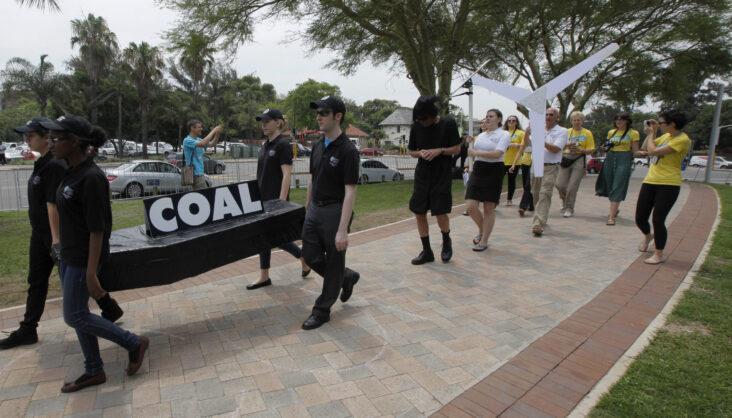Africa-Press – Mauritius. Empty highways, grounded airplanes, closed offices, deserted malls and shuttered hotels owing to COVID-19 containment measures, have led to an unprecedented drop in demand for oil, lowering its prices and causing turmoil in the oil market.
But it’s also opened the door to pushing ahead with low-carbon economy. Suddenly, the concept of stranded assets is no longer a niche idea, but has now become the talk of the town.
Stranded assets are defined as assets that have suffered from unanticipated or premature write-downs, devaluations, or conversion to liabilities.
The shift to a low-carbon economy, an inevitable choice to mitigate climate change, is a known driver of asset stranding. A low-carbon economy aims to minimise greenhouse gas emissions, in relation to today’s carbon intensive fossil economy.
Transition risks from societal efforts, including changes in public regulation, technology or preferences towards a Paris-Agreement world, will continue to cause dramatic falls in demand for fossil fuels.
Estimates show that approximately a third of the current oil reserves, half the gas reserves, and almost 90% of coal reserves would need to be become un-burnable carbon to achieve the global temperature target of the Paris Agreement.
Oil companies are adjusting to the reality of their prized oil assets becoming their greatest liability. BP, Total SE, Royal Dutch Shell Plc, and Chevron have written off billions of dollars of assets that are no longer economically viable.
British energy giant (BP) conceded in its 2020 Energy Outlook that oil consumption would peak this decade, and the world’s oil resources are unlikely to ever be fully exploited.
Looking ahead to 2050, the outlook projected that demand for oil would fall over the next 30 years – by at least 10% this decade, and as much as 50% over the next 20 years.
BP slashed up to $17.5bn off the value of its assets as the ongoing global COVID-19 pandemic continues to impact consumption.
The oil giant is poised to dispose a large chunk of its stranded assets even if oil prices rally.
Citing drop in oil price and assumptions about the viability of some oil and gas assets and the timing of peak demand, French Multinational Total SE booked an exceptional $8bn impairment in its second quarter of 2020 results.
The bulk of the write down – $7bn – applies to its carbon-intensive Canadian oil sands assets alone. The oil sands are among the world’s sources of dirty oil.
The Royal Dutch Shell announced that it would take aggregate post-tax impairment charges in the range of $15bn to $22bn in the second quarter of 2020, as it laid out plans to reduce greenhouse gas emissions to net-zero by 2050.
The stranded assets identified in the Shell announcement include oil products across the refining portfolio, liquefied natural gas operations in Australia, and upstream operations in Brazil and North America Shales.
Another oil giant, Chevron Corporation booked a $10.4bn asset write-off with impairment charges in the fourth quarter of 2019.
The assets include the Appalachian Basin Shale in United States, Kitimat LNG Project in Canada and the Big Foot offshore operation in the Gulf of Mexico.
Despite the massive write-offs in recent months, no major fossil fuel energy company has aligned its emissions pathway with limiting climate change to 2 degrees Celsius, according to research by Transition Pathway Initiative (TPI), a global initiative which assesses companies’ preparedness for the transition to a low-carbon economy.
The Paris Agreement builds upon the United Nations Framework Convention on Climate Change (UNFCCC) to chart a new course in the global climate effort.
Ratified in 2016, the Agreement commits the world to limiting global warming to 2 degrees Celsius above pre-industrial levels, with a stretch goal of 1.5 degrees Celsius. Commentators have highlighted the role of divestment campaigns in stranding of fossil assets.
The divestment movement is a transnational advocacy network that uses a range of strategies to shame, pressure, facilitate, and encourage investors in general, and large institutional investors in particular, to relinquish their holdings of fossil fuel stocks in favour of climate-friendly alternatives.
The concept is rooted in science which requires that the vast majority of global fossil fuel reserves, between 60% and 80%, cannot be burned if we are to avert catastrophic climate changes.
The fossil divestment movement has gathered momentum to become the fastest-growing divestment campaign in history.
Institutions committed to divestment include sovereign wealth funds, banks, global asset managers and insurance companies, cities, pension funds, health care organizations, universities, faith groups and foundations.
Assets committed to divestment have leapt from $52bn in 2014, to over $14trn.
This means more potentially stranded fossil assets. According to projections by the International Energy Agency, around $300bn of investment in fossil fuel assets could be stranded, as the world takes the 2 degrees Celsius path.
The current wave of stranded assets presents two key challenges to African countries: it portends energy insecurity and threatens public revenue. Energy insecurity is a stark problem in sub-Saharan Africa, which suffers the most debilitating energy poverty in the world.
The Africa Energy Outlook 2019 projected that profound demographic changes such as exploding population and rural-urban migration are set to drive economic growth, infrastructure development and, in turn, energy demand on the continent.
Failure to meet this demand will hinder the attainment of the Sustainable Development Goals (SDGs) and the continent’s Agenda 2063. As the global appetite for crude oil wanes, the already pressurised public revenue of oil-dependent African countries will be further upended.
Africa, home to five of the top 30 oil-producing countries, is endowed with 7.3% of the world’s gas reserves and 7.2% of the world’s oil reserves.
Some 70% of the countries’ exports are derived from oil, gas and mineral sectors, accounting for about half of Africa’s gross domestic product (GDP), as well as contributing significantly to government revenues across the continent.
Africa’s economic wellbeing has depended, to a great extent, on its natural resources, therefore, stranded assets presents public policy challenges to African leaders and researchers. However, the stranded assets phenomenon is insufficiently researched from the perspective of Africa.
Recent research by the United Nations University Institute for Natural Resources in Africa (UNU-IRA) reveals that the risk of asset stranding is not on the African policy agenda.
The big issue is how exactly would we run an entire continent without oil which has been the wellspring of our complex civilization? Experts have recommended switching up a gear on renewable power will make economic and developmental sense in the long term.
While the road to going green is fraught with many difficulties, Africa has the potential for building low-carbon climate-resilient economies and societies.
For example, Africa has the highest bioenergy potential (agricultural residues and bioenergy crops) in the world.
According to an International Renewable Energy Agency (IRENA) report, sustainable biomass feedstock in the continent could meet its transportation need, and surpass its requirements for industrial power and process heat.
The continent also has the richest solar resources on the planet, but has installed only 5 gigawatts of solar photovoltaics (PV), accounting for less than 1% of global capacity.
The future is clear: the direction of travel for Africa is away from fossil fuels. The structural shift towards low-carbon and more resilient energy system will require fiscal incentives, legal and regulatory reforms, technology acquisition and transfer, amongst other supportive measures.
Delivering public goods such as energy security and developmental opportunities requires cooperation and solidarity. It is imperative for African leaders, scholars and all other relevant stakeholders to institutionalise transnational governance to actively align their efforts towards a shared objective of providing clean, quality and affordable energy to the over 1.33 billion people on the continent.
For More News And Analysis About Mauritius Follow Africa-Press







